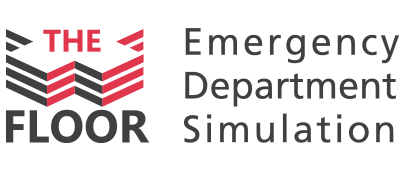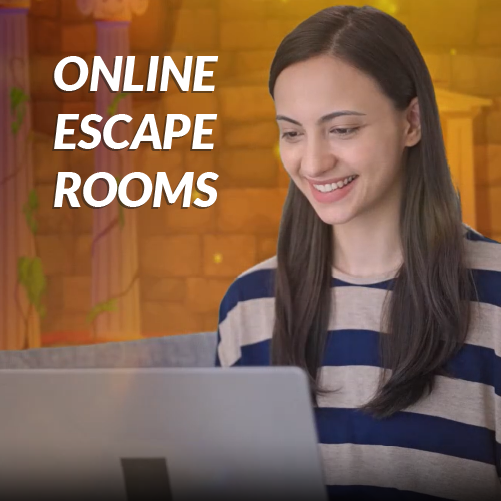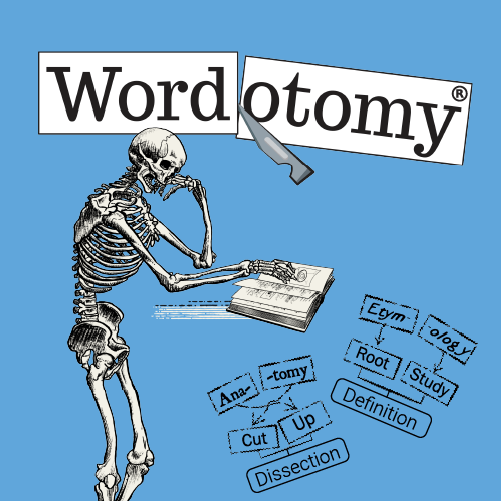"An excellent way of practising real decision making skills in a fun and approachable way. It should be available as a resource for all EM staff"
David Bentley, ACCS CT3 Emergency Medicine
Brighton A&E staff practise with 'crisis' board game
The Floor featured on BBC One South East Today, 24/02/2020
The busiest department of any hospital is usually the emergency department, (ED). With constantly shifting patient acuity and flow, as well as staffing levels and experience, managing ‘the shop floor’ is a difficult but essential skill. It forms part of the Royal College of Emergency Medicine, (RCEM), curriculum.
"Fantastic realistic game showing the true image of working in ED. Great team game & I loved the competitiveness of it"
Will Rowell, ED Charge Nurse
Table-top simulation is a familiar feature in major incident and natural disaster training. It is a cost-effective way of training staff to respond to serious incidents. With increasing pressures in emergency departments, we decided to develop an easy to use table-top simulation to develop the skills essential to manage a busy and ever-changing emergency department.
The Floor is intense, enjoyable and effective. It has been tested in a range of emergency departments across the world with doctors, nurses and executive managers, (clinical and non-clinical).
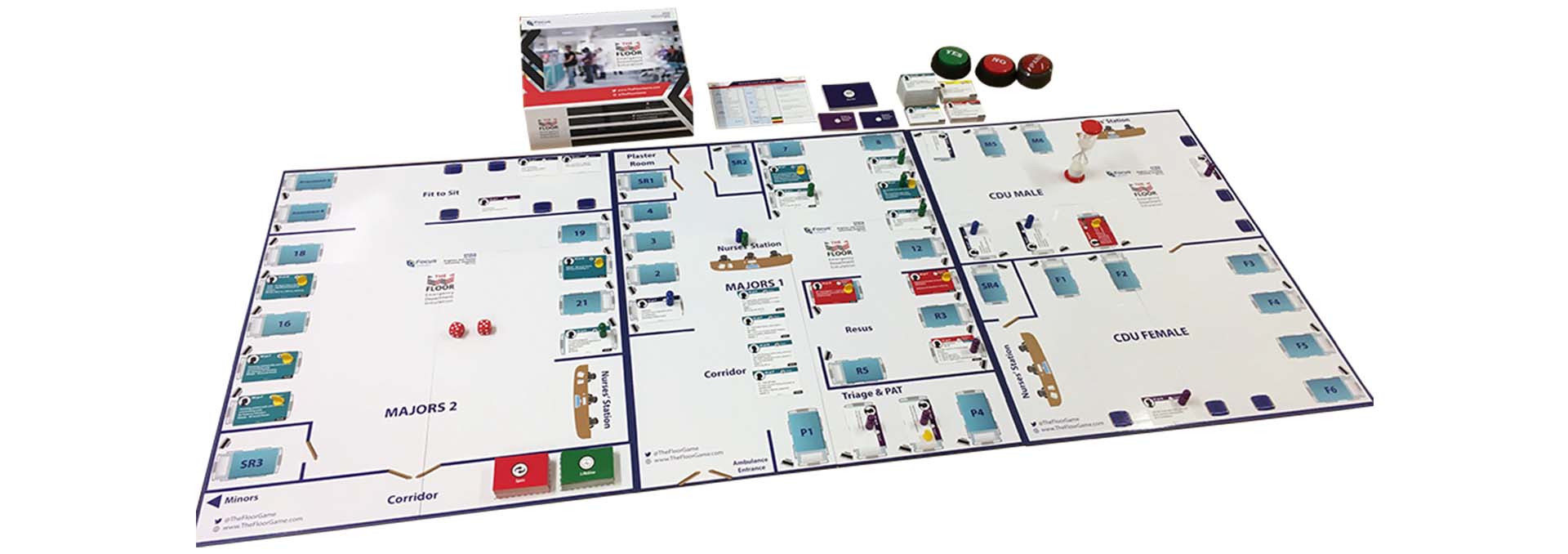
"I learnt a lot about the difficulties and challenges faced by ED Consultants - it was really good to observe and understand the operational and clinical challenges."
Peter Landstrom, Chief Delivery and Strategy Officer, Western Sussex Hospitals NHS Foundation Trust & Brighton and Sussex University Hospitals NHS Trust.
What does THE FLOOR do?
- Simulates the normal workings of a major trauma centre in an intense game-based training experience, to help clinicians, managers and students develop the skills necessary to manage an ED ‘shop floor’.
- Can recreate specific situations to help staff spot issues and problems. Allows staff to plan more effectively and to explore stress test strategies.
- Helps staff improve the way they work together in a multi-disciplinary team.
- Effective way of supporting and informing senior decision making.
- Is a flexible training resource that can be used, and reused, for daily departmental management as well as major incident training.
"Brilliant idea and great way to grasp the stresses of A&E as a whole rather than just the section you are looking after. I loved it."
Abbie Buss, Band 6 ED Nurse.
How is THE FLOOR being used?
The game has now been played with a range of ED healthcare professionals – senior house officers, foundation doctors, registrars, (SpRs), consultants, nurses, health care assistants, (HCA), and management teams. It has been played and tested in a range of organisations and settings in the UK, USA and Myanmar. The Floor is used routinely at BSUH during Major Incident training days for ED nurses, HCAs; and is formally part of the teaching and training programme for junior doctors of all grades.
What's in the box?
"I am a first-year medical student. I thought that the game was a brilliant simulation of the stresses that we face in A&E on a day to day basis, whilst at the same time being really enjoyable to play. It was also a great team-building exercise."
Zac Lanza, 1st year Medical Student and HCA, Leeds University.
The cost: for unlimited group ED simulation training
Standard Price for 1 game:
£900 (plus VAT and delivery)
The Floor is a sophisticated group training tool designed to help improve performance and safety. The game includes a wide range of scenarios, events and patient profiles. Making The Floor a very flexible and adaptive training resource for all ED staff and managers.
If you only use the game once with 12 people = £75 per person for 90 minutes of training.
But, you can use The Floor as often as you want. Every time you play the cost is diluted. At Brighton and Sussex University Hospitals they’ve used their game 10 times this year with over 100 staff members. The cost is now:
Less than £10 per person for 90 minutes of training.
The training happens in the workplace, so disruption is minimised. No external support is required so there are no hidden costs. How does this compare to other forms of training?
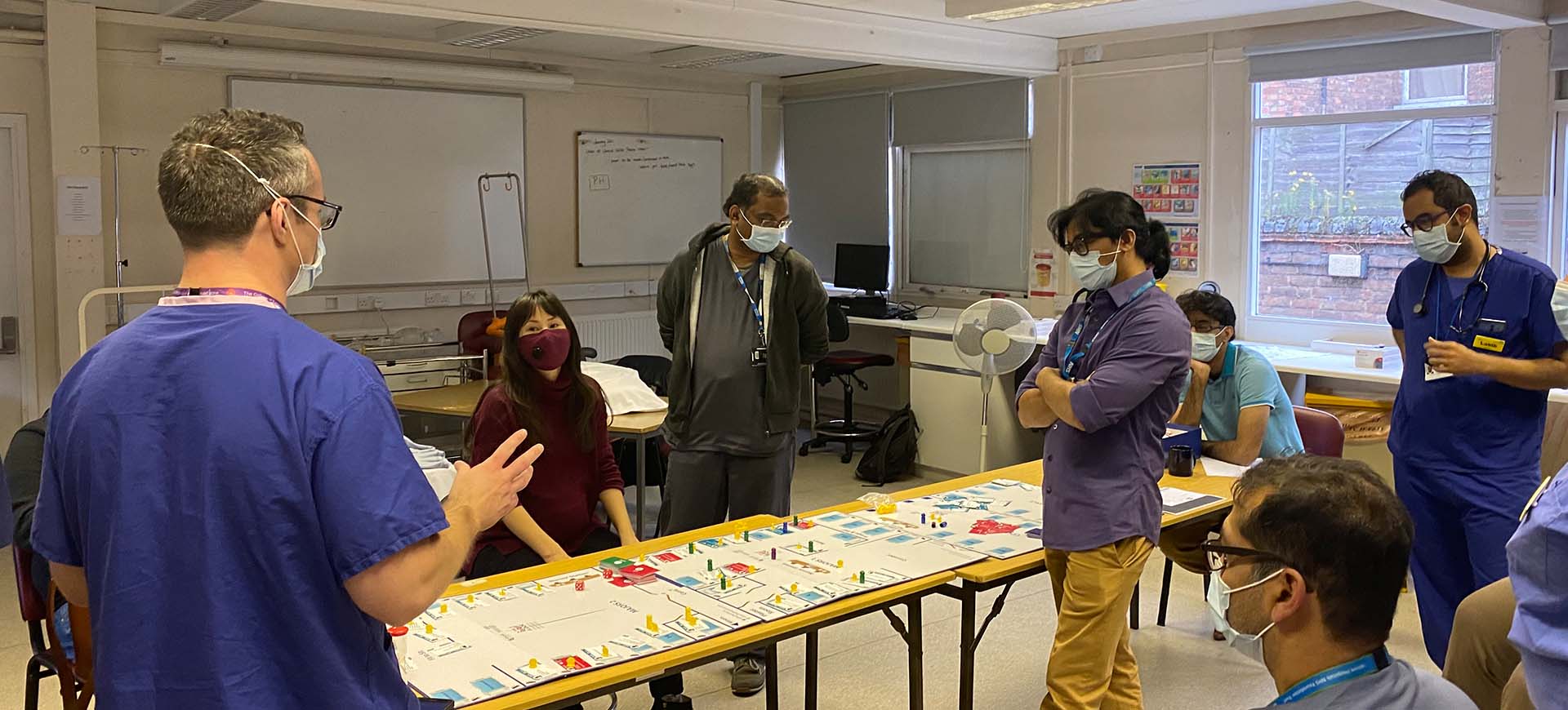
Dr Salwa Malik - inventor of THE FLOOR:
About Salwa
Dr Salwa Malik is an Emergency Medicine Consultant and the Emergency Department Simulation Lead at Brighton and Sussex University Hospitals NHS Trust. She studied Medicine at Imperial College School of Medicine and completed her Foundation training at Addenbrookes’ and West Suffolk Hospital NHS Trust. She then completed her Emergency Medicine training in the Kent, Surrey and Sussex (KSS) Deanery.
Why did Salwa invent the game?
Simulation in healthcare has traditionally revolved around the “Sim Lab” – a controlled physical space where simulated interactions occur between clinicians and a patient, often in the form of a mannequin. While this offers high-fidelity simulation of isolated clinical scenarios, it is ill-suited to simulating the time-critical triaging, assessment and initial management of multiple patients at the same time – a daily occurrence in the Emergency Department, (ED).
As a registrar in 2015, Salwa created an early version of The Floor to help with a Mock Major Incident day she was organising for her Higher Specialist Trainees, (HSTs). It was based on the actual floor plans of Royal Sussex County Hospital Emergency Department. Recognising the intervention’s potential as a training tool. Salwa developed it as a board game – adding dice, coin tosses, funny sounds, lifeline and spin cards, to add to the chaos, pressure and enjoyment.
Got some queries about THE FLOOR?
Please complete this form and we will get in touch.



